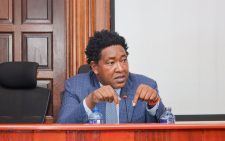Survivor using experience to spread fistula awareness

Sarah Omega, a fistula survivor who battled the condition for 12 years, says that she has turned to schools to spread awareness.
Speaking in Mt Elgon during the International Day to End Obstetric Fistula, Sarah revealed that together with schools and other stakeholders, she has reached out to institutions in nine counties to spread and share information about the condition.
Sarah, the founder of Let’s End Fistula Initiative (LEFI), highlights that the rise of teenage pregnancies in these regions puts young mothers at risk.
This year’s theme is ‘Her Health, Her Rights; Shaping a Future without Fistula’.
According to the Kenya Health Demographic Survey (KHDS) Report, 2022, Bungoma reported high teenage cases.
Data from the KDHS 2022 shows that 62 per cent of women in the county experienced both physical and sexual violence.
“When a young girl gets pregnant, she is also at risk of getting the condition because her organs have not developed enough to help push out the baby,” she says.
Sarah is running programmes to restore dignity to those affected by fistula.
She reveals that she stayed out of marriage for 12 years after she suffered fistula.
Obstetric fistula is characterised by a hole in the birth canal caused by prolonged obstructed labour, which leads to uncontrollable leakage of urine or stool.
Sarah got pregnant at a tender age, leading to a stillbirth, which left her with an injury that later developed into fistula.
“I got a fistula condition when I was 19 years old. The baby was huge, and during birth, it could not pass because the birth canal was narrower,” she recalls.
She experienced depression and was rejected by family and friends.
“I rejected myself before I was rejected, I could not go out and do the things I used to do as a teenager, I felt I was trapped, the condition sent me into isolation,” Sarah says, adding that she also battled unbearable postpartum physical pains.
“I could spend my nights crying because of the unbearable pain from the genitalia, during the day you have to really starve yourself, but the nights were moments of shedding tears because of the pain,” she recalls.
Spreading awareness
After battling fistula for 12 years, she developed depression and was taken to Moi Teaching and Referral Hospital (MTRH), and it was here that she learnt about fistula treatment. While still at MTRH hospital, she underwent fistula surgery repair and her life was restored.
After healing from the condition, she became a fistula champion and formed LEFI, advocating for addressing fistula matters in Kenya and is currently active in nine counties.
The counties Sarah has worked in include Bungoma, Busia, Kakamega, Migori, Siaya, Trans- Nzoia, Uasin-Gishu, Vihiga and West Pokot.
To help address fistula cases in the region, her organisation has rolled out programmes through four strategic focus areas: Finding and linking patients with treatment opportunities, Economic empowerment, Social integration and Encouraging survivors to become advocates.
Through her advocacy, Sarah has been able to reach out to over 2,000 women whom she followed up on and procured treatment for. In Bungoma, the plight of over 200 women in Mt Elgon has been restored.
“Mt Elgon is one of the fistula hotspot in this region because of the 2007- 2008 post- election violence when women faced rape, defilement and sexual gender-based violence (SGBV) and most of them got fistula,” she said.
The World Health Organisation (WHO) reports that each year between 50,000 to 100,000 women worldwide are affected by obstetric fistula.
“We are focusing on the prevention messaging on issues around expectant women utilising Antenatal services and putting emphasis on expectant women delivering under a skilled birth attendant,” she notes.
Sarah argues that the goal of ending fistula by 2030 is unlikely to be achieved, citing global reports which reveal that, on average, 5 out of every 100 women are affected by the condition.
“There are some countries where medical insurance takes care of fistula surgical treatment, like in Kenya, the Social Health Authority (SHA) should take care, I believe that if we ever get to those levels as a nation, it will be safe,” she says.
Janet Chebet, medical superintendent of Cheptais sub-county Hospital, cited retrogressive practices such as female genital mutilation (FGM), using traditional birth attendants and gender-based violence (GBV) as some of the contributors of fistula cases in the region.
“Most of the women who went through FGM suffer from fistula,” the medic says.














